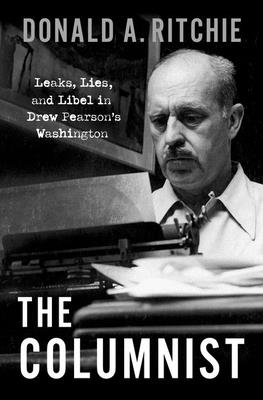The Columnist: Leaks, Lies, and Libel in Drew Pearson's Washington

The Columnist: Leaks, Lies, and Libel in Drew Pearson's Washington
Long before Wikileaks and social media, the journalist Drew Pearson exposed to public view information that public officials tried to keep hidden. A self-professed "keyhole peeper", Pearson devoted himself to revealing what politicians were doing behind closed doors. From 1932 to 1969, his
daily "Washington Merry-Go-Round" column and weekly radio and TV commentary broke secrets, revealed classified information, and passed along rumors based on sources high and low in the federal government, while intelligence agents searched fruitlessly for his sources. For forty years, this syndicated columnist and radio and television commentator called public officials to account and forced them to confront the facts. Pearson's daily column, published in more than 600 newspapers, and his weekly radio and television commentaries led to the censure of two US
senators, sent four members of the House to prison, and undermined numerous political careers. Every president from Franklin Roosevelt to Richard Nixon--and a quorum of Congress--called him a liar. Pearson was sued for libel more than any other journalist, in the end winning all but one of the
cases. Breaking secrets was the heartbeat of Pearson's column. His ability to reveal classified information, even during wartime, motivated foreign and domestic intelligence agents to pursue him. He played cat and mouse with the investigators who shadowed him, tapped his phone, read his mail, and planted
agents among his friends. Yet they rarely learned his sources. The FBI found it so fruitless to track down leaks to the columnist that it advised agencies to simply do a better job of keeping their files secret. Drawing on Pearson's extensive correspondence, diaries, and oral histories, The
Columnist reveals the mystery behind Pearson's leaks and the accuracy of his most controversial revelations.
Long before Wikileaks and social media, the journalist Drew Pearson exposed to public view information that public officials tried to keep hidden. A self-professed keyhole peeper, Pearson devoted himself to revealing what politicians were doing behind closed doors. From 1932 to 1969, his
daily Washington Merry-Go-Round column and weekly radio and TV commentary broke secrets, revealed classified information, and passed along rumors based on sources high and low in the federal government, while intelligence agents searched fruitlessly for his sources. For forty years, this syndicated columnist and radio and t
PRP: 185.23 Lei
Acesta este Pretul Recomandat de Producator. Pretul de vanzare al produsului este afisat mai jos.
166.71Lei
166.71Lei
185.23 LeiLivrare in 2-4 saptamani
Descrierea produsului
Long before Wikileaks and social media, the journalist Drew Pearson exposed to public view information that public officials tried to keep hidden. A self-professed "keyhole peeper", Pearson devoted himself to revealing what politicians were doing behind closed doors. From 1932 to 1969, his
daily "Washington Merry-Go-Round" column and weekly radio and TV commentary broke secrets, revealed classified information, and passed along rumors based on sources high and low in the federal government, while intelligence agents searched fruitlessly for his sources. For forty years, this syndicated columnist and radio and television commentator called public officials to account and forced them to confront the facts. Pearson's daily column, published in more than 600 newspapers, and his weekly radio and television commentaries led to the censure of two US
senators, sent four members of the House to prison, and undermined numerous political careers. Every president from Franklin Roosevelt to Richard Nixon--and a quorum of Congress--called him a liar. Pearson was sued for libel more than any other journalist, in the end winning all but one of the
cases. Breaking secrets was the heartbeat of Pearson's column. His ability to reveal classified information, even during wartime, motivated foreign and domestic intelligence agents to pursue him. He played cat and mouse with the investigators who shadowed him, tapped his phone, read his mail, and planted
agents among his friends. Yet they rarely learned his sources. The FBI found it so fruitless to track down leaks to the columnist that it advised agencies to simply do a better job of keeping their files secret. Drawing on Pearson's extensive correspondence, diaries, and oral histories, The
Columnist reveals the mystery behind Pearson's leaks and the accuracy of his most controversial revelations.
Long before Wikileaks and social media, the journalist Drew Pearson exposed to public view information that public officials tried to keep hidden. A self-professed keyhole peeper, Pearson devoted himself to revealing what politicians were doing behind closed doors. From 1932 to 1969, his
daily Washington Merry-Go-Round column and weekly radio and TV commentary broke secrets, revealed classified information, and passed along rumors based on sources high and low in the federal government, while intelligence agents searched fruitlessly for his sources. For forty years, this syndicated columnist and radio and t
Detaliile produsului








